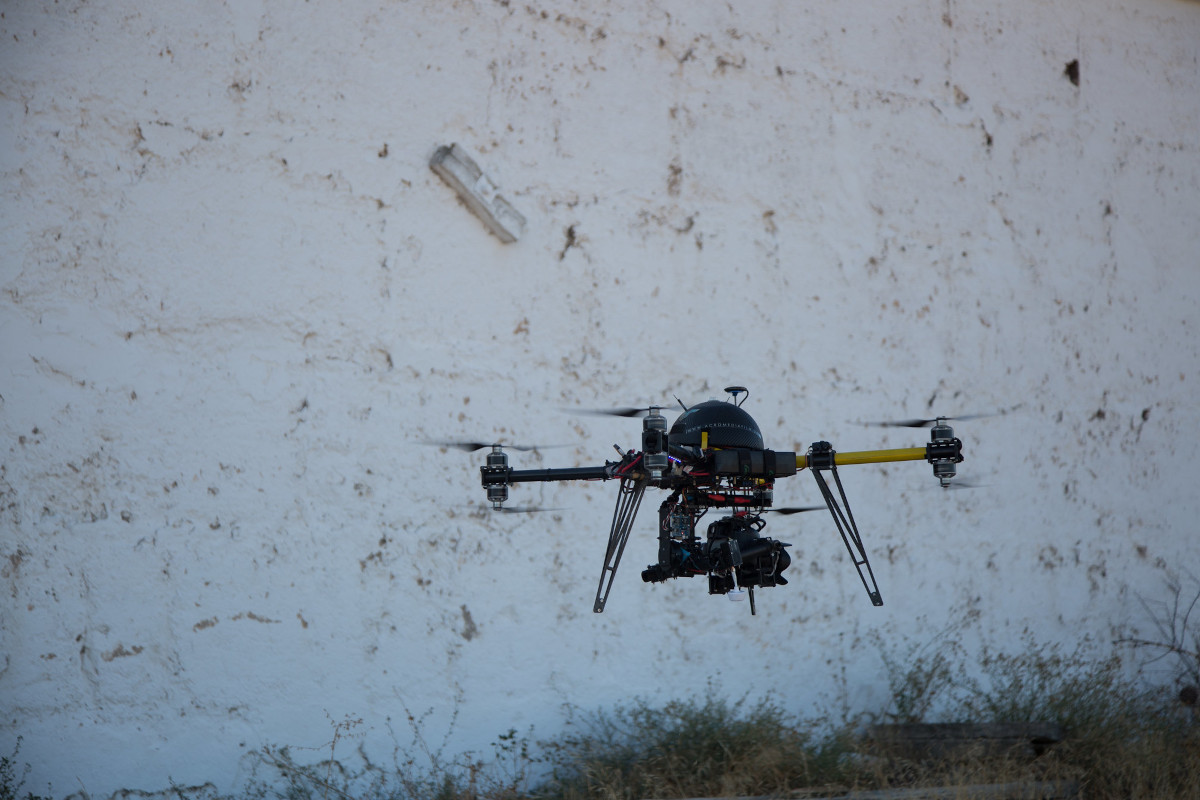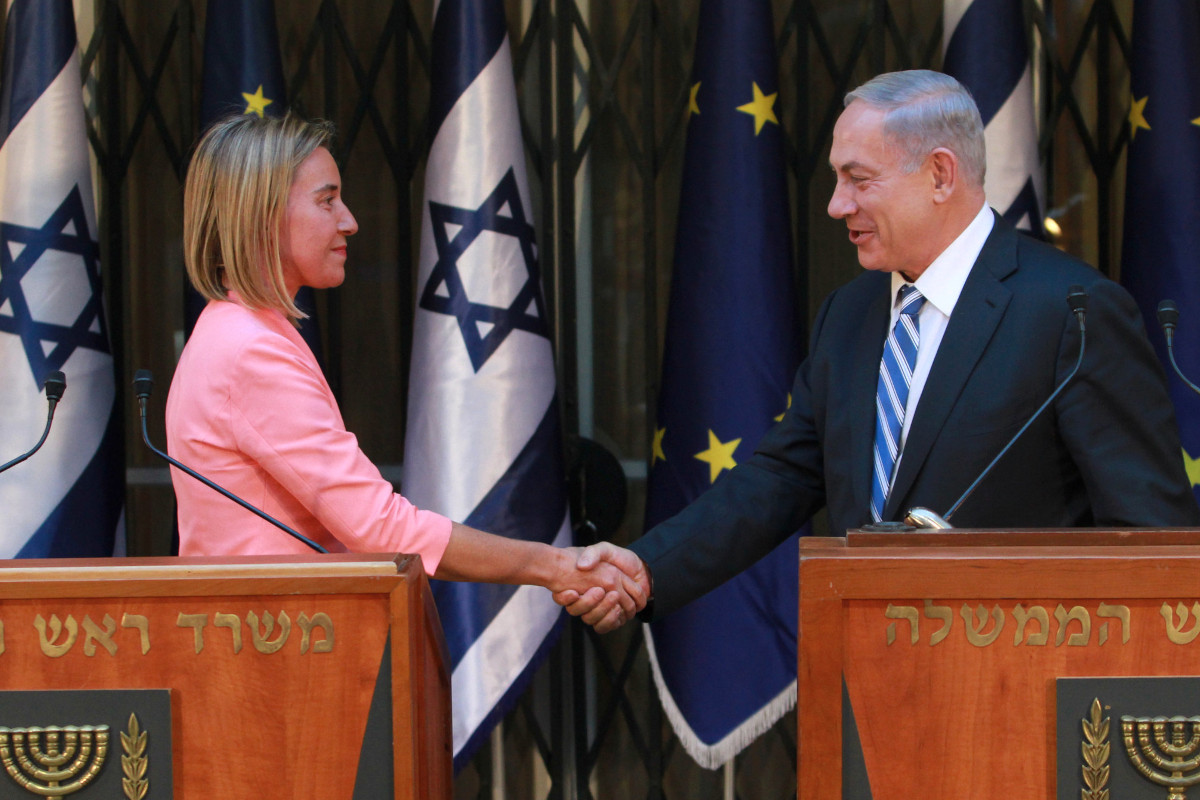EU-funded drone technology being used in war on Gaza
Topic
Country/Region
22 March 2024
A drone manufacturer that is “supporting the IDF [Israel Defense Forces] 100%” in the war on Gaza received a €50,000 research and development grant from the EU, an analysis published today by Statewatch and Informationsstelle Militarisierung (Information Centre on Militarisation, IMI) reveals. Other Israeli military companies and institutions have received millions of euros for drone development in recent years, despite a supposed prohibition on EU funding for military and defence projects.
Support our work: become a Friend of Statewatch from as little as £1/€1 per month.

A drone (not produced by any of the companies cited in this article) in the sky. Image: Bold Content, CC BY 2.0
This article is published in partnership with Informationsstelle Militarisierung (IMI). Eine angepasste Version auf Deutsch ist hier verfügbar.
Drone manufacturer “supporting the IDF 100%”
The drone manufacturer, Xtend, received €50,000 from the EU’s Horizon Europe budget to produce a feasibility study that, amongst other things, identified steps to optimise a prototype of its Skylord Xtender drone system and to help find “[k]ey strategic partners for the production and commercialisation” of the technology. [1]
Those partners turned out to be predominantly Western military forces. The company signed a contract with the US Department of Defense in May 2021, a transaction that also involved the Israeli Ministry of Defence. Since the attacks of 7 October, Xtend “put its former activities on hold and redirected energies to supporting the IDF 100%,” according to an interview with the company’s CEO. [2]
The Statewatch/IMI report notes:
It is doubtful whether the EU's €50,000 in research funding has made a significant contribution here – but what purpose the funding of an obviously military and armaments-related start-up could have had beyond that seems equally questionable. [3]
Ban on military funding
The EU treaties prohibit the financing of “expenditure arising from operations having military or defence implications,” but this prohibition is being worked around or cast aside in the EU’s search for “strategic autonomy.” [4]
The legislation underpinning EU research programmes has always required “an exclusive focus on civil applications,” although Horizon Europe also allows for “coordination with Union-funded defence research… in order to strengthen synergies, recognising that there are areas of dual-use technology.” [5]
Ursula von der Leyen, president of the European Commission, recently called for “a new European defence mindset from institutions to industries to investors” that can meet “the urgent need to rebuild, replenish and modernise member states' armed forces.” [6]
Millions for drone research by military entities
The Statewatch/IMI report also examines a number of other EU-funded projects through which millions of euros in public money has been granted to Israeli companies and public institutions, including the country’s Ministry of Defence.
The Ministry of Defence has been involved in at least two EU-backed drone research projects in recent years – ResponDrone and UnderSec – receiving a total of €200,000 for its work.
The projects were worth far more overall – ResponDrone, which began in May 2019, received almost €8 million in EU funding for its efforts to develop “a multi-UAS [unmanned aerial system] platform for first responders to enhance their situational awareness,” to support emergency services with “enhanced capabilities to support assessment missions, search and rescue operations, as well as forest fire fighting.” [7]
Alongside the German Aerospace Centre (Deutsches Zentrum für Luft- und Raumfahrt, DLR), which received €1.3 million from the EU, the Spanish drone manufacturer Alpha received just over €1.4 million, while Israel Aerospace Industries also received some €1.4 million.
UnderSec, which began in October 2023, has been awarded €6 million in EU funding “to develop a modular and holistic prototype system featuring multimodal sensors and robotic assets” in order to create greater situational awareness and improve the “response capabilities for ships, ports, and maritime infrastructures.” [8]
Alongside the Israeli Ministry of Defence, Israeli weapons company Rafael Advanced Defense Systems is to received €450,000 for its role in the project, which is coordinated by Germany’s Fraunhofer Institute, which will receive almost €600,000.
The Statewatch/IMI report highlights that both projects have clear potential military applications, as do other EU-funded projects that involve Israeli companies. Sightec received almost €2.5 million from for a project developing independent navigation technology for drones, ostensibly to facilitate drone delivery services, but as the report notes: “GPS-independent and autonomous navigation under conditions of targeted jamming are primarily a military issue.”
The report examines a number of potential explanations for the EU’s provision of research funding to Israeli military and defence entities, but concludes:
…the EU's support for the Israeli arms industry is undoubtedly questionable from a moral and legal point of view - especially in light of the current indictment for alleged genocide in Gaza. This is justified, amongst other things, by genocidal statements made by high-ranking Israeli officials and politicians, including the Israeli Minister of Defence, whose ministry is being funded to participate in EU research projects.
Quotes
Christoph Marischka, peace researcher, activist and member of the IMI board said:
From the beginning, the EU's 'security research' aimed at dual-use and was a gift to the European, Turkish and Israeli arms industry. It is a logical consequence that the outcomes of this research are now applied on various battlefields - like Gaza.
Chris Jones, Statewatch Director, said:
Human rights groups have called on the EU to suspend its association agreement with Israel due to the disastrous effects of the latter’s assault on Gaza: huge civilian casualties, mass displacement and the razing of infrastructure. This report shows that the EU also needs to take a long, hard look at the companies it provides with research and development funding. Public money should be used for the public good, not to support companies that profit from war and destruction.
Notes
[1] https://cordis.europa.eu/project/id/887959
[2] https://www.calcalistech.com/ctechnews/article/skrkv9u8t
[3] ‘European money for the war in Gaza: how EU research funding supports the Israeli arms industry’, Statewatch/Informationsstelle Militarisierung, 22 March 2024
[4] Article 41(2), Consolidated version of the Treaty on European Union, https://eur-lex.europa.eu/legal-content/EN/TXT/?uri=CELEX:12008M041; on “strategic autonomy” see Mark Akkerman and Chloé Maulewaeter, ‘From war lobby to war economy: How the arms industry shapes European policies’, European Network Against Arms Trade, September 2023, https://enaat.org/wp-content/uploads/2023/12/ENAAT-Report-WarLobby2WarEconomy_Sept2023-FINAL.pdf
[5] https://eur-lex.europa.eu/legal-content/EN/ALL/?uri=CELEX:32021D0764
[6] https://sciencebusiness.net/news/european-defence-fund/europe-must-urgently-invest-defence-technologies-says-ursula-von-der
[7] https://cordis.europa.eu/project/id/833717
[8] https://cordis.europa.eu/project/id/101121288
Our work is only possible with your support.
Become a Friend of Statewatch from as little as £1/€1 per month.
Further reading

European money for the war in Gaza: how EU research funding supports the Israeli arms industry
Technologies developed with financial support from Europe are being used in the current war in Gaza, as they have been previously in occupation of Palestinian territory and marginalisation of the Palestinian people.

Palestine: 300 academics call for halt to EU research funding that violates international law
Almost 300 academics from universities across Europe and beyond have called for the EU to stop funding research projects "that may, directly or indirectly, violate international law and human rights," in particular with regard to substantial research funding the EU provides to institutions in Israel.

EU missions in Palestine ponder role for "day after" Gaza bombardment ends
Two reports from EU security missions in Palestine, dealing with policing and border control, indicate that officials are pondering their role in the planning for whatever happens when Israel's bombardment of the Gaza strip ends.
Spotted an error? If you've spotted a problem with this page, just click once to let us know.

